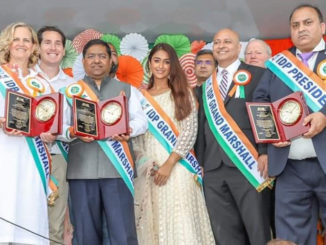
NEW DELHI / NEW YORK (TIP): India’s Foreign Secretary Harsh Vardhan Shringla on 4 September 2020 delivered a major foreign policy lecture on “The Broad Canvas of Indian Diplomacy during the Pandemic,” during a virtual event organized by Indian Council of World Affairs, one of India’s premier and oldest foreign policy think tanks.
The scale and spread of the event covered the length and breadth of India, with participants from 28 states and 4 union territories. With 2000 registered participants, the lecture was attended by a diverse array of distinguished think-tankers and eminent academics, including deans and vice chancellors of prestigious universities and research centers.
The Foreign Secretary’s lecture was a broad overview of Indian foreign policy. He described the fundamental impulses that underlie it in a rapidly changing international environment. He also spoke about its contemporary challenges and direction.
The Foreign Secretary pointed out that the current pandemic has affected every facet of India’s national life and its external policies. It has been an enormous economic shock. It is also likely to have serious geopolitical repercussions.
The pandemic has exposed the deficiencies of globalization. The Foreign Secretary said that India is an advocate of globalization that is human-centric. He also spoke about the Prime Minister’s vision of “Atmanirbhar Bharat.” Atmanirbharta is not about inward-looking withdrawal from a globalized world. Instead, it aims to strengthen India’s position as a prime participant in global supply chains and as a major player in global trade and innovation.
The Foreign Secretary said that India is committed to multilateralism. He referred to India’s forthcoming tenure as a non- permanent member of the UN Security Council. He also referred to India’s forthcoming presidencies of G-20, BRICS and SCO. These are testimony to India’s enhanced global standing, providing India an opportunity to project its priorities and participate in generating global solutions.
India’s first priority remains its neighborhood. Its Neighborhood First policy reflects this central focus.. India’s engagements with ASEAN countries under Act East and with the Indian Ocean Region in line with Security and Growth for All in Region (SAGAR) vision have also strengthened. India’s Think West outreach to West Asian countries, and its engagements with African countries have intensified.
Terrorism continues to remain a growing threat, while non-traditional challenges in space, cyber-space and biological domains are complicating the security landscape.
India takes its development partnerships very seriously. It is committed to working its partners in the spirit of sabka saath, sabka vikas.
During the pandemic, India established that it was a responsible member of the international community through its actions in supplying drugs such as Hydroxychloroquine and Paracetamol. These are investments it has made in the future. It has built on its reputation as the “pharmacy of the world.”
He drew attention to the fact that serving the diaspora and Indians abroad is one of India’s highest priorities. More than 1.2 million Indians have returned home to India under the Vande Bharat Mission, the largest repatriation exercise of this nature undertaken in recent history.





Be the first to comment